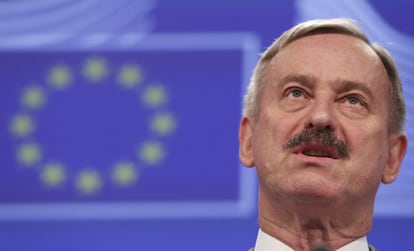Brussels asks Spain for two more years of belt-tightening
More cuts likely to be counterproductive in a country that faces a winter of discontent on job front

Economic recovery is taking hold, the banking system has improved, unemployment is beginning a timid retreat, the European bank bailout has worked, and public finances are stabilizing. Spring is in the air in the reports coming out of Brussels and the statements coming out of government officials’ mouths.
But despite the good news, the European Commission wants Spain to have an extra spoonful of the same medicine. While its deficit targets for 2014 will be easily met, things are not so clear for the years 2015 and 2016, leading Brussels to request “considerable additional discretionary efforts.”
In other words, what the European executive wants to see is more cuts, according to the first report following Spain’s clean exit from the banking bailout.
While the Popular Party (PP) government is working on fiscal reform and an oft-mentioned lowering of taxes, Brussels wants to avoid just that, given that, despite the efforts, Spain’s public deficit is still above 7% of gross domestic product (GDP), while public debt stands at 100% of GDP.
We could soon see an unexpected Paris-Rome-Madrid axis against Berlin’s iron grip on European leadership
“Spain must continue down the path of adjustment,” reads the report, written in the usual orthodox fashion. These efforts are not set down in figures, but the revenue forecast for 2015 varies wildly depending on who’s counting: there is a €20-billion gap between what Spain expects to make and what Brussels expects Spain to make.
But while the EC may provide advice and issue warnings, it lacks the power of old. Madrid is no longer under the tutelage of the Troika (the authority made up of the EC, the European Central Bank and the International Monetary Fund that is overseeing bailed-out countries) and the Commission is a lame duck waiting for the May 25 European elections, which could bring in new faces and new ideas.
Besides, these days Brussels is less concerned about Spain than about France and Italy, whose governments are showing their claws in a bid to get some leeway in the application of fiscal rules. On Wednesday, Spain tacitly joined this front, in what could ultimately become an unexpected Paris-Rome-Madrid axis against Berlin’s iron grip on European leadership. Far from following the EC’s advice on the need for fresh efforts, Deputy Prime Minister Soraya Sáenz de Santamaría anticipated very different plans when she stated that “now is the time for growth measures” following two-and-a-half years of cuts.
It remains to be seen whether this new attitude is pure rhetoric or something more.
Yet deep down, both Brussels and Madrid are talking about the same thing: the need for a new tax system that somehow simultaneously allows the economy to grow and the state to collect more.
Spain’s problem is that it trails the field in terms of tax revenues: 37% of GDP, even less than Greece, which does not cover public spending (44% of GDP, under the European average). And this can only be resolved through a tax reform that will be a key issue in the next general election.
Brussels is trying to eliminate any temptation by Madrid to lower taxes with a view to winning re-election
Brussels is trying to eliminate any temptation by Madrid to lower taxes with a view to winning re-election. On Wednesday, the EC hammered away at its favorite prescription of higher indirect taxes that will allow authorities to lower the direct ones, especially labor-related ones. The IMF and the Organization for Economic Co-operation and Development (OECD) have spent the last 40 years telling governments to raise the value-added tax (VAT) rate and lower contributions to social security. But the Spanish executive did the exact opposite in December, increasing contributions and resisting a new VAT hike like the last one, which garnered widespread criticism in Spain.
Another slew of cuts could be counterproductive in a country that is up to its eyeballs in debt and still facing a long winter of discontent on the labor front. Perhaps that is why the Brussels report contains as many challenges as it does words of praise.
“The high levels of private and public debt continue to put recovery and financial stability at risk,” it says. “Bank results are under pressure from non-performing loans, a deterioration of asset quality and the impact of deceleration in Latin America. There are delays in some reforms.”
Stabilization will still take “years,” the report warns.
Tu suscripción se está usando en otro dispositivo
¿Quieres añadir otro usuario a tu suscripción?
Si continúas leyendo en este dispositivo, no se podrá leer en el otro.
FlechaTu suscripción se está usando en otro dispositivo y solo puedes acceder a EL PAÍS desde un dispositivo a la vez.
Si quieres compartir tu cuenta, cambia tu suscripción a la modalidad Premium, así podrás añadir otro usuario. Cada uno accederá con su propia cuenta de email, lo que os permitirá personalizar vuestra experiencia en EL PAÍS.
¿Tienes una suscripción de empresa? Accede aquí para contratar más cuentas.
En el caso de no saber quién está usando tu cuenta, te recomendamos cambiar tu contraseña aquí.
Si decides continuar compartiendo tu cuenta, este mensaje se mostrará en tu dispositivo y en el de la otra persona que está usando tu cuenta de forma indefinida, afectando a tu experiencia de lectura. Puedes consultar aquí los términos y condiciones de la suscripción digital.









































